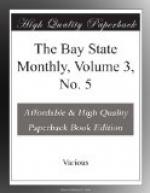The Republican newspapers have all been pleased to remark that President Cleveland has done a very decent thing by refusing to appoint as post-master at Mr. Blaine’s home, in Augusta, the Democratic editor, who “was virulently active in publishing particularly unclean falsehoods concerning the Republican candidate last fall.” Mr. Blaine had a perfect right to object, and he exercised the right, to the appointment of Morton; and likewise, the President had a perfect right not to heed the objection,—a right, however, which he did not exercise. The action of the President therefore commends itself to the right-thinking men of all parties.
So far as the Editor’s Table can remember, this is the first opportunity that the Republican newspapers have improved to say anything good of President Cleveland, who, it is not forgotten, was a target for as virulent and uncalled for abuse as was ever heaped upon any known American citizen. Magnanimity is always in order even in politics.
* * * * *
Civil Service Reform seems to-day to be the mare of the Mugwumps and the nightmare of everybody else. The eloquence or, if you please, the waste of words which the minority employ in advocating its deceptive principles, is only to be contrasted with the almost ludicrous indifference with which both Republican and Democratic majorities regard it. Thoughtful people are, at this time, more concerned with the prospective treatment of the tariff problem.
Now, it is neither our purpose nor desire to add to the literature of discussion, on this important theme; but one thought which occurs to us may here be submitted in the form of a question. People who talk much on tariff topics are supposed to be interested in the same, and to have some reason, good, bad, or indifferent, for advancing their diverse arguments.
To all such, the inquiry may be addressed:—Are you sure that you believe in a “protective” tariff because you think it is a public benefit, or because you think it is a private benefit?
And again:—Does “protective” tariff protect? If it does,—whom?
Last autumn, the cry arose throughout the land that free trade meant the destruction of home labor, and the “introduction of the pauper labor of Europe,” or at least a competition at home with the pauper labor of Europe. Well, some very dismal pictures have been drawn of the condition of the pauper labor of Europe, and when thinking of them, it must be confessed that one does not like to run any risks.
But suppose that we widen the thought a little. At this very moment, the iron monopoly of this country is raising a fund to head off a tariff revision, or to bring about an increased duty. What can be said of the Iron Monopoly? This, as one fact; that in Pennsylvania, it employs miners at fourteen dollars a month, charges them five dollars a month each for a tenement in which to live, and charges




